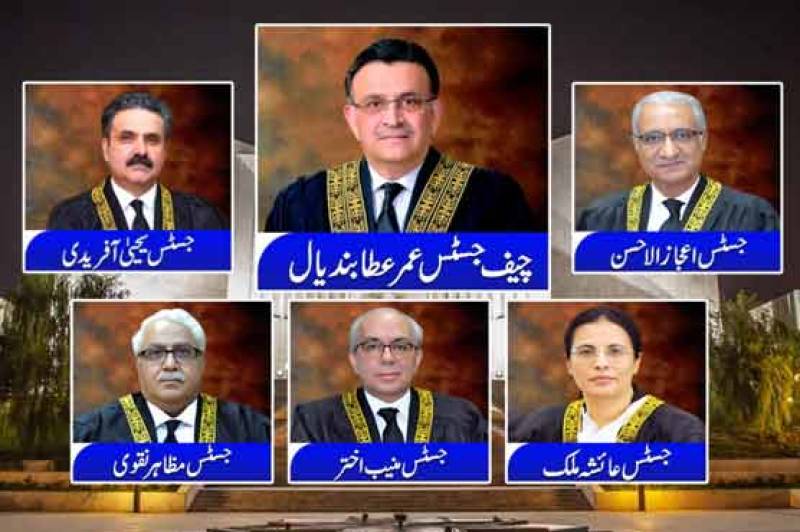Islamabad (Web Desk): Chief Justice of Pakistan (CJP) Umar Ata Bandial on Thursday said that the Supreme Court (SC) would stop armed forces from resorting to any unconstitutional moves as the top court heard petitions challenging the trial of civilians in military courts.
A six-member bench, led by the CJP and comprising Justice Ijazul Ahsan, Justice Munib Akhtar, Justice Yahya Afridi, Justice Sayyed Mazahar Ali Akbar Naqvi, and Justice Ayesha Malik, heard the case.
During today’s hearing, the CJP expressed regret and grief over the events of May 9 and stressed that he didn’t want the “army to raise their weapons against the people of Pakistan”.
He said armed forces should be praised for not opening fire on civilians despite the violence on May 9, recalling that people in Mianwali had broken into and attacked army installations.
“However, the military will not be allowed to take any illegal steps,” he noted.
The CJP further said the court was of the opinion that there was a further need to hear Attorney General for Pakistan (AGP) Mansoor Usman Awan’s arguments but contended that the court would not be able to do so for at least two weeks due to the unavailability of judges.
Earlier, Attorney General for Pakistan (AGP) Mansoor Awan assured the court that the 102 civilian suspects currently under military custody will be fairly treated during ongoing trials.
He claimed that his assurance are coming from the military’s top leadership.
Concessions are being made for May 9 suspects on the court’s insistence, Awan said.
The AGP said that no efforts are being made to overturn the Constitution of Pakistan. "What happened on May 9 is before everyone,” He said.
"Remember one thing –they are the armed forces. If they are attacked, they have weapons to defend themselves,” AGP Awan said.
He said that the army is equipped to fire bullets. “It is not possible that if they are attacked, they first approach an SHO to lodge a formal complaint.”
Awan said that they (the military) could have opened fire (on citizens0 on May 9.
At this, one of the petitioners, Barrister Aitzaz Ahsan asked the AGP why the military did not open fire then on the day itself.
"We do not want that such a situation is created next time that the army resorts to opening fire.
This is why we are conducting (military) trials," the AGP said.
At this, Barrister Ahsan observed that the incumbent government’s tenure ends on August 12.
"How can they give assurances then?” he asked.
At the outset of the hearing. Aitzaz Ahsan told the court that the parliament has passed a new law, which grants intelligence agencies the powers to search anyone at any time without a warrant.
He said that there are six SC judges on this bench. "At this time, the status of this bench is like that of a full court," Barrister Ahsan said.
Ahsan said that this legislation has essentially given unlimited powers to the intelligence agencies.
The apex court should take suo motu notice against the Official Secrets Act, he added, referring to the Official Secrets (Amendment) Bill 2023 approved by the National Assembly earlier this week.
At this , the CJP inquired whether this legislation is a bill that has been introduced or it has been passed into law. “Let us see what the upper house does.”
“We do not know much about this matter, only read about it in the newspapers.
The decision of the larger bench is that the CJP alone cannot take suo motu notice. Fortunately, the bill is yet under debate in the Senate,” remarked the CJP.
The CJP thanked Barrister Ahsan for raising the matter before the court, at which the latter observed that the situation currently prevailing in the country is similar to martial law.
At one point during the hearing, Justice Munib Akhtar observed that the state cannot deprive citizens of their fundamental rights even if it wishes to.
“If a civilian steals something from a soldier, will he be dealt with under the Army Act? (Ensuring) fundamental rights of citizens cannot be left to the sweet will of parliament,” he said.
On Wednesday, the top court rejected a plea seeking the formation of a full court to hear petitions challenging the civilians’ trial in military courts.
CJP Umar Ata Bandial announced a reserved verdict.
“Full court is not available till September,” read the verdict and adding that court holidays are going on while there are other engagements of the judges as well, which are being affected by this case.
On May 9, alleged workers and supporters of the Pakistan Tehreek-e-Insaf (PTI) vandalized and set fire to state and army properties and memorials in the wake of the party chief’s arrest by paramilitary troops from the premises of the Islamabad High Court (IHC).
A number of petitions were filed before the SC challenging the government’s decision to put May 9 suspects through military trials.
The petitioners include, PTI chief, civil society members, senior politician Chaudhry Aitzaz Ahsan and former CJP Jawad S Khawaja.


